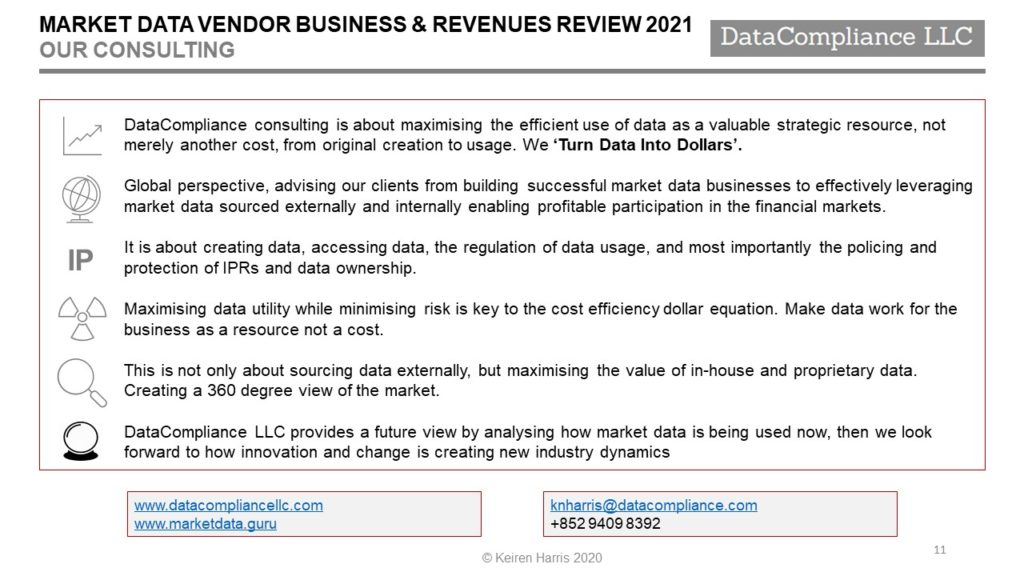2020 IN REVIEW DIFFERENT VENDORS, DIFFERENT REVENUE MODELS
The Top 10 vendors estimated revenues for all business activities grew from in 2011 $24,283 Million to 2019 $36,732 Million, i.e. an increase of 51.2% over the period
Ever since 2011 Bloomberg has been the undisputed market leader in revenue generation with an estimated $11,000 Million in income year ending 31/12/2020, and as a standalone entity enters 2021 still number one.
However, a new candidate has ‘e-merged’, in 2020 S&P Global ($7,442 Million) and IHS Markit ($4,288 Million) generated combined revenues of $11,730 Million
This passing of the baton sets the market data industry tone for the 2020s where datasets created around IP are perceived to have the greatest value.
The vendors can be divided into 2 categories, whose core businesses are different, albeit there are significant overlaps:
- Proprietary and IP based data vendors, offering services such as Evaluated Pricing, Financial Benchmarks, Indices, Credit Markets and Analytics. This financial information providers group includes ICE Data, IHS Markit, MSCI, plus S&P Global
From 2019 to 2020 these vendors combined revenues grew from $14,882 Million to $15,762 Million, 6%.
2. Data aggregators like Bloomberg, Factset, IRESS, Morningstar, Refinitiv (ex Thomson Reuters F&R), and SIX Financial saw significantly lower revenue growth. Refinitiv’s revenues have been steadily declining since 2010.
From 2019 to 2020 these vendors combined revenues grew from $20,221 Million to $20,963 Million in 2019, or 3.6%.
Key Events for 2021
• Finalisation of the S&P Global/IHS Markit which will create a new market leader by revenue with combined income of $11,730 Million compared to Bloomberg’s estimated $11,000 Million. As this has not been completed the 2 companies are being kept separate for this report
• Completion of the LSEG/Refinitiv merger which has already seen LSEG forced into spending $1,370 Million (£1 Billion) on integration costs, the announcement of which promptly spooked the markets. Refinitiv is treated as a standalone business.
• This is the first example of a combined exchange venue/market data business where information services is larger than the venue
These 2 events demonstrate and emphasise the difference between IP based financial data services and aggregated data models
Key Trends in 2020
• ICE Data of a financial information provider that is successfully transitioning its strategy from aggregation to proprietary data services.
• In 2020 this resulted in an internal demerger with ICE Data splitting into the larger ‘Fixed Income & Analytics’ division, and smaller ‘Exchange Data & Connectivity’ division. For comparative purposes these are treated as one unit in this report
• Strategic shifts from reliance upon aggregated data services also encompasses, Transaction Services, Risk & Compliance services, and RegTech.
• Each vendor is identifying individual market growth niches, carving out micro-monopolies, some of which are not so small now, however there is little interest from the regulators
All figures produced in this report are in US Dollars are based upon Bloomberg published FX rates on 12/04/2021





FUTURE CHALLENGES
2021 Impacts
Covid 19 was unforeseen and is having wide ranging impacts which for market data vendors is proving to accelerate existing trends
• While the long term work from home situation is probably well over-blown there is no doubt that Banks have been forced to consider publishing and distributing market data in a broader environments
• This means considering technology and infrastructure and trying to introduce lightweight more flexible systems preferably at less cost. Being locked into legacy market data infrastructure is now a serious competitive disadvantage
• Banks have talked about pooling their data for years, 2021 could be the year they overcome their traditional unwillingness to do something about it, courtesy of the regulators. This would certainly change their dynamic with the vendors
2021 Summary
• The S&P Global/IHS Markit merger is more representative of the future than the LSEG/Refinitiv deal by combining horizontal IP data strengths instead of vertical integration, plus the extreme lack of balance between the data and core exchange businesses unlike ICE/ICE Data or Deutsche Börse/Qontigo
• This is partly due to the limited number of exchanges and not enough vendors of appropriate size and reach, but more because there are few vendors available that are able to offer a sufficient return on investment
• Equally the mantra is now ‘financial intelligence’, being able to offer more than just data, but also analytics and tools to make investment decisions
The combination of these factors skews the market data value proposition even further towards IP driven businesses built around proprietary data, indices and analytics and away from traditional aggregators
Keiren Harris 13/04/2021
Please email knharris@marketdata.guru for a pdf or information about out consulting services


